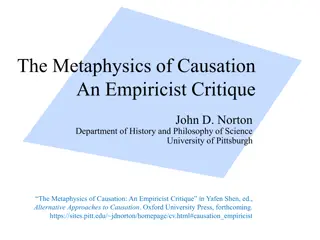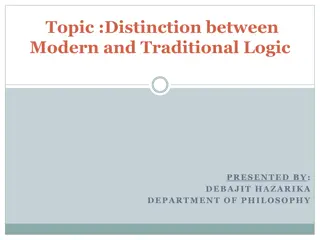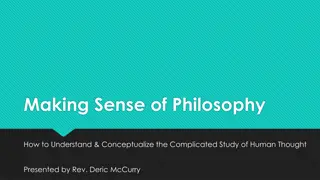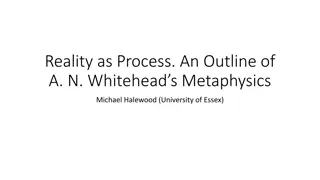Exploring Philosophical Branches: Epistemology, Metaphysics, Logic, and Axiology
Branches of Philosophy delve into various aspects of human knowledge and existence. Epistemology examines how individuals acquire knowledge, while Metaphysics ponders the nature of reality. Logic explores reasoning processes, and Axiology studies principles and values concerning ethics and aesthetics. These branches offer diverse perspectives on human understanding and the universe.
Download Presentation

Please find below an Image/Link to download the presentation.
The content on the website is provided AS IS for your information and personal use only. It may not be sold, licensed, or shared on other websites without obtaining consent from the author. Download presentation by click this link. If you encounter any issues during the download, it is possible that the publisher has removed the file from their server.
E N D
Presentation Transcript
BRANCHES OF PHILOSOHPY EPISTEMOLOGY considers how people come to learn what they know. Derived from the Greek word episteme, meaning knowledge or understanding, epistemology refers to the nature and origin of knowledge and truth. Epistemology proposes that there are four main bases of knowledge: divine revelation, experience, logic and reason, and intuition. METAPHYSICS considers the physical universe and the nature of ultimate reality. It asks questions like, What is real? What is the origin of the world? What is beyond the stars? Your consideration of reality as an external creation or an internal construct can influence your metaphysical beliefs and perspectives. LOGIC AXIOLOGY considers the study of principles and values. These values are divided into two main kinds: ethics and aesthetics. Ethics is the questioning of morals and personal values. Aesthetics is the examination of what is beautiful, enjoyable, or tasteful. SOCIAL PHILOSOPHY (POLITICAL PHILOSOPHY, LEGAL PHILOSOPHY) PHILOSOPHY OF LANGUAGE PHILOSOPHY OF MIND
BRANCHES OF PHILOSOHPY EPISTEMOLOGY considers how people come to learn what they know. Derived from the Greek word episteme, meaning knowledge or understanding, epistemology refers to the nature and origin of knowledge and truth. Epistemology proposes that there are four main bases of knowledge: divine revelation, experience, logic and reason, and intuition. METAPHYSICS considers the physical universe and the nature of ultimate reality. It asks questions like, What is real? What is the origin of the world? What is beyond the stars? Your consideration of reality as an external creation or an internal construct can influence your metaphysical beliefs and perspectives. LOGIC AXIOLOGY considers the study of principles and values. These values are divided into two main kinds: ethics and aesthetics. Ethics is the questioning of morals and personal values. Aesthetics is the examination of what is beautiful, enjoyable, or tasteful. SOCIAL PHILOSOPHY (POLITICAL PHILOSOPHY, LEGAL PHILOSOPHY) PHILOSOPHY OF LANGUAGE PHILOSOPHY OF MIND
BRANCHES OF PHILOSOHPY EPISTEMOLOGY considers how people come to learn what they know. Derived from the Greek word episteme, meaning knowledge or understanding, epistemology refers to the nature and origin of knowledge and truth. Epistemology proposes that there are four main bases of knowledge: divine revelation, experience, logic and reason, and intuition. LOGIC METAPHYSICS considers the physical universe and the nature of ultimate reality. It asks questions like, What is real? What is the origin of the world? What is beyond the stars? Your consideration of reality as an external creation or an internal construct can influence your metaphysical beliefs and perspectives. AXIOLOGY considers the study of principles and values. These values are divided into two main kinds: ethics and aesthetics. Ethics is the questioning of morals and personal values. Aesthetics is the examination of what is beautiful, enjoyable, or tasteful. SOCIAL PHILOSOPHY (POLITICAL PHILOSOPHY, LEGAL PHILOSOPHY) PHILOSOPHY OF LANGUAGE PHILOSOPHY OF MIND
BRANCHES OF PHILOSOHPY EPISTEMOLOGY considers how people come to learn what they know. Derived from the Greek word episteme, meaning knowledge or understanding, epistemology refers to the nature and origin of knowledge and truth. Epistemology proposes that there are four main bases of knowledge: divine revelation, experience, logic and reason, and intuition. METAPHYSICS considers the physical universe and the nature of ultimate reality. It asks questions like, What is real? What is the origin of the world? What is beyond the stars? Your consideration of reality as an external creation or an internal construct can influence your metaphysical beliefs and perspectives. AXIOLOGY considers the study of principles and values. These values are divided into two main kinds: ethics and aesthetics. ETHICS is the questioning of morals and personal values. AESTHETICS is the examination of what is beautiful, enjoyable, or tasteful. LOGIC SOCIAL PHILOSOPHY (POLITICAL PHILOSOPHY, LEGAL PHILOSOPHY) PHILOSOPHY OF LANGUAGE PHILOSOPHY OF MIND
BRANCHES OF PHILOSOHPY EPISTEMOLOGY considers how people come to learn what they know. Derived from the Greek word episteme, meaning knowledge or understanding, epistemology refers to the nature and origin of knowledge and truth. Epistemology proposes that there are four main bases of knowledge: divine revelation, experience, logic and reason, and intuition. METAPHYSICS considers the physical universe and the nature of ultimate reality. It asks questions like, What is real? What is the origin of the world? What is beyond the stars? Your consideration of reality as an external creation or an internal construct can influence your metaphysical beliefs and perspectives. LOGIC SOCIAL PHILOSOPHY (POLITICAL PHILOSOPHY, LEGAL PHILOSOPHY) AXIOLOGY considers the study of principles and values. These values are divided into two main kinds: ethics and aesthetics. ETHICS is the questioning of morals and personal values. AESTHETICS is the examination of what is beautiful, enjoyable, or tasteful. PHILOSOPHY OF LANGUAGE PHILOSOPHY OF MIND
BRANCHES OF PHILOSOHPY EPISTEMOLOGY considers how people come to learn what they know. Derived from the Greek word episteme, meaning knowledge or understanding, epistemology refers to the nature and origin of knowledge and truth. Epistemology proposes that there are four main bases of knowledge: divine revelation, experience, logic and reason, and intuition. METAPHYSICS considers the physical universe and the nature of ultimate reality. It asks questions like, What is real? What is the origin of the world? What is beyond the stars? Your consideration of reality as an external creation or an internal construct can influence your metaphysical beliefs and perspectives. LOGIC AXIOLOGY considers the study of principles and values. These values are divided into two main kinds: ethics and aesthetics. ETHICS is the questioning of morals and personal values. AESTHETICS is the examination of what is beautiful, enjoyable, or tasteful. PHILOSOPHY OF LANGUAGE SOCIAL PHILOSOPHY (POLITICAL PHILOSOPHY, LEGAL PHILOSOPHY) PHILOSOPHY OF MIND
BRANCHES OF PHILOSOHPY EPISTEMOLOGY considers how people come to learn what they know. Derived from the Greek word episteme, meaning knowledge or understanding, epistemology refers to the nature and origin of knowledge and truth. Epistemology proposes that there are four main bases of knowledge: divine revelation, experience, logic and reason, and intuition. METAPHYSICS considers the physical universe and the nature of ultimate reality. It asks questions like, What is real? What is the origin of the world? What is beyond the stars? Your consideration of reality as an external creation or an internal construct can influence your metaphysical beliefs and perspectives. LOGIC AXIOLOGY considers the study of principles and values. These values are divided into two main kinds: ethics and aesthetics. ETHICS is the questioning of morals and personal values. AESTHETICS is the examination of what is beautiful, enjoyable, or tasteful. SOCIAL PHILOSOPHY (POLITICAL PHILOSOPHY, LEGAL PHILOSOPHY) PHILOSOPHY OF MIND PHILOSOPHY OF LANGUAGE
BRANCHES OF PHILOSOHPY EPISTEMOLOGY considers how people come to learn what they know. Derived from the Greek word episteme, meaning knowledge or understanding, epistemology refers to the nature and origin of knowledge and truth. Epistemology proposes that there are four main bases of knowledge: divine revelation, experience, logic and reason, and intuition. METAPHYSICS considers the physical universe and the nature of ultimate reality. It asks questions like, What is real? What is the origin of the world? What is beyond the stars? Your consideration of reality as an external creation or an internal construct can influence your metaphysical beliefs and perspectives. LOGIC AXIOLOGY considers the study of principles and values. These values are divided into two main kinds: ethics and aesthetics. ETHICS is the questioning of morals and personal values. AESTHETICS is the examination of what is beautiful, enjoyable, or tasteful. SOCIAL PHILOSOPHY (POLITICAL PHILOSOPHY, LEGAL PHILOSOPHY) PHILOSOPHY OF LANGUAGE PHILOSOPHY OF MIND
BRANCHES OF PHILOSOHPY Greek logos has a variety of meanings including word, thought, idea, argument, account, reason or principle.
BRANCHES OF PHILOSOHPY Logic is the study of correcness or incorrectness of reasoning, or the study of the principles and criteria of valid inference and demonstration. It attempts to distinguish good reasoning from bad reasoning.
BRANCHES OF PHILOSOHPY In Aristotle s oppinion logic is a necessary reasoning , because its conclusions are inescapable.
BRANCHES OF PHILOSOHPY Logic studies formal systems of inference and arguments in natural language.
BRANCHES OF PHILOSOHPY Logic seeks to organize reasoning. Students of logic learn how to think in a structurally sound manner.
BRANCHES OF PHILOSOHPY Logic has two types: deductive and inductive reasoning.
BRANCHES OF PHILOSOHPY Deductive reasoning involves examining a general case, deducing a general set of rules or principles, and then applying these rules to specific cases.
BRANCHES OF PHILOSOHPY Inductive reasoning involves taking specific examples and considering the general principles, rules, or cases that caused them.
ANSWER 1. Name some of the branches of philosophy. 2. What is logos? 3. How would you define logic? 4. Who was Aristotle? 5. How did Aristotle define logic? 6. What are formal systems of inference? 7. What are two types of logic? 8. Is this statement correct: Deductive reasoning applies rules and principles to specific cases?























